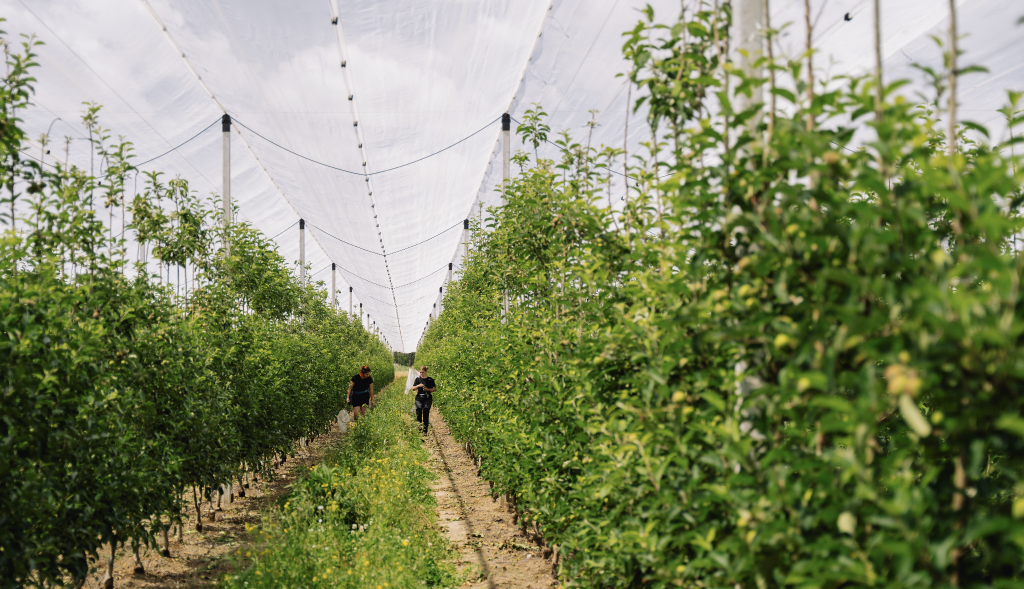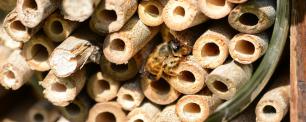Climate change is making bees more sensitive to pesticides
Major declines in bee populations have been observed in recent decades, and they are linked to factors such as climate change, land-use change, biological invasions, and pesticide use. Previous studies have shown that such stressors do not act in isolation; they interact with each other and can be a deadly cocktail for bees. That has now been confirmed through a study led by researchers from CREAF and the Autonomous University of Barcelona (UAB), who conducted an experiment in which warmer winter temperatures were found to shorten the life expectancy of solitary bees of the Osmia genus (important fruit tree pollinators) and increase their vulnerability to the effects of pesticides.

"In the worst of the two warming scenarios we simulated, the bees lived for around five days fewer than in normal conditions. That might not seem like a big difference, but with a lifespan as short as that of Osmia bees — approximately 20 days — the consequences for population dynamics could be devastating."
SERGIO ALBACETE, predoctoral CREAF researcher and main author of the study.
Multiple effects
Published in the journal Global Change Biology, the study analysed the effects of the interaction between climate change and pesticides. To that end, the researchers exposed wild European orchard bees (Osmia cornuta) to two realistic winter temperature rise scenarios and to sublethal doses of the insecticide Sulfoxaflor.
While the levels of insecticide to which bees are exposed during the flowering season are generally not enough to kill them, they can affect their physiology and behaviour and, consequently, their reproductive success.
The results obtained showed there to be synergistic effects between climate change and exposure to pesticides. Ingestion of the higher dose of insecticide led to a 50% reduction in the lifespan of bees not exposed to warm winter temperatures. When the same dose of insecticide was combined with the most pessimistic climate change scenario, the lifespan reduction rose to 70%. “An increase in winter temperatures results in the Osmia bees consuming their energy reserves and depleting their fat body,” states Albacete. “A bee’s fat body plays a crucial role in the detoxification process through which substances such as pesticides are removed, so we assume that bees with lower energy reserves are more sensitive to the effects of pesticides,” he continues.
Exposure to warmer winters and sublethal doses of the insecticide not only reduced the bees’ longevity but also affected their response to light and feeding behaviour. “While the levels of insecticide to which bees are exposed during the flowering season are generally not enough to kill them, they can affect their physiology and behaviour and, consequently, their reproductive success,” Albacete points out.

Prohibition and European legislation
With a view to protecting pollinators, the application of the vast majority of insecticides is prohibited during the flowering season. Nonetheless, many such products are persistent, meaning that residues of those applied before the flowering season can still be present in the pollen and nectar of treated crops when pollinator activity is at its height. And, as CREAF and UAB researcher and study co-author Anselm Rodrigo explains, while the effects observed in the experiment were the result of exposing bees to a realistic dose of a single insecticide, in agricultural systems bees are chronically exposed to a wide variety of agrochemicals (insecticides, fungicides, herbicides, etc.). “That further complicates their survival,” he warns.
Although the study’s climate scenarios were based on IPCC temperature projections for the future, the conditions to which the bees were exposed can be considered realistic and relevant to the present.

"The temperatures in our most pessimistic climate scenario have already been reached in recent years during particularly warm winters. So, the impacts we observed in the study could be affecting wild pollinator populations right now"
JORDI BOSCH, investigador del CREAF i co-autor de la recerca.
The other institutions involved in the study, besides CREAF and the UAB, were the Institute of Evolutionary Biology (CSIC-Pompeu Fabra University) and the University of Bologna. According to the authors, studies of this kind highlight the need to consider multiple stressors in order to understand declines in bee populations. The study’s results underline the importance of revising the toxicity thresholds used in pesticide risk assessment under European legislation, as bee populations are facing increasingly warmer temperatures and the protection those thresholds offer may be insufficient.
Reference article: Albacete S, Sancho G, Azpiazu C, Rodrigo A, Molowny-Horas R, Sgolastra F, Bosch J. Bees exposed to climate change are more sensitive to pesticides. Glob Chang Biol. 2023 Nov;29(22):6248-6260. doi: 10.1111/gcb.16928. Epub 2023 Sep 1. PMID: 37656005.







